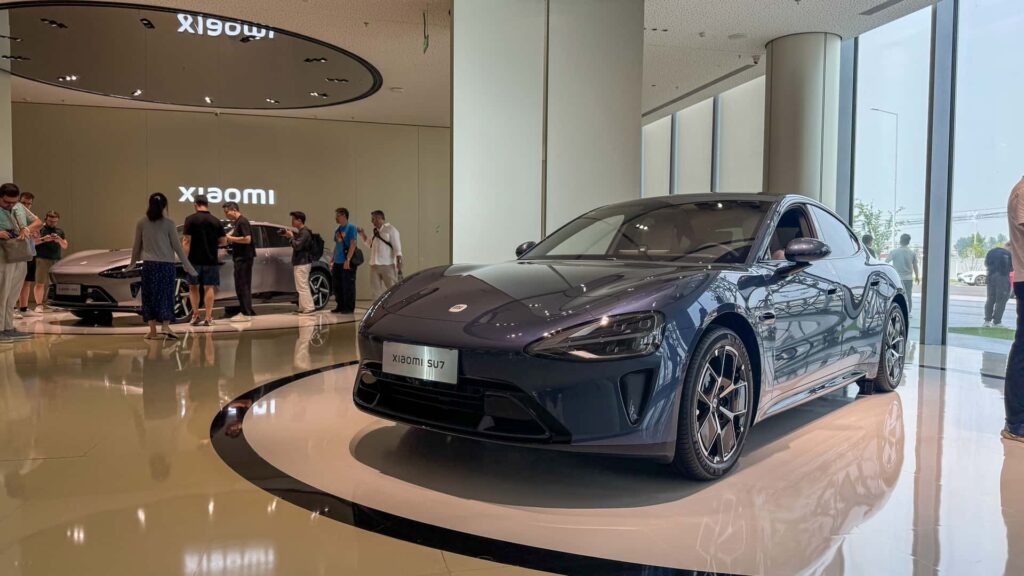China has emerged as a dominant force in the global electric vehicle (EV) industry in recent years, leaving even seasoned industry leaders in awe. Ford CEO Jim Farley, in particular, has been vocal about his admiration for China’s advancements in EV technology, cost-efficiency, and quality.
During a recent interview at the Aspen Ideas Summit, Farley expressed his admiration for China’s EV sector, calling it “the most humbling thing” he has ever witnessed. He recounted his numerous trips to the country over the past year to study the competition and was particularly impressed by the advanced technology present in Chinese electric vehicles.
The concept of “smartphones on wheels” or “software-defined vehicles” has been a long-standing goal for the auto industry, with Tesla leading the charge in creating tech-savvy vehicles. However, Farley noted that Chinese companies have taken the in-vehicle digital experience to a whole new level, surpassing what is currently available in the US market.
Farley highlighted the presence of tech giants like Huawei and Xiaomi in Chinese cars, noting that these vehicles seamlessly integrate with users’ digital lives. Features such as AI companions, automatic payments, facial recognition, and personalized media experiences set Chinese EVs apart from their Western counterparts.
One of the key factors driving China’s success in the EV market is the substantial government subsidies, vertical integration, and manufacturing scale that Chinese firms have leveraged to reduce costs and improve quality. Farley emphasized that the cost and quality of Chinese EVs far exceed what is currently available in the West, posing a significant challenge to foreign automakers.
BYD, China’s leading EV manufacturer, has gained widespread attention for its low-cost Seagull hatchback, priced under $10,000 domestically and around $26,000 in Europe. This competitive pricing, coupled with top-tier quality, has put pressure on global automakers to ramp up EV production, lower battery costs, and stay profitable in a rapidly evolving market.
While some analysts warn of potential consolidation in China’s oversaturated car market, the overall trend indicates that Chinese car companies are poised for global expansion, posing a formidable challenge to foreign competitors. As the EV race intensifies, automakers like Ford are closely monitoring China’s advancements to stay competitive in the ever-evolving automotive landscape. As high tariffs continue to keep Chinese cars out of the U.S. market, auto executives are increasingly anticipating their eventual arrival on American shores. Ford, in particular, is taking proactive steps to prepare for this inevitable competition.
One key strategy Ford is employing is learning from the Chinese market. CEO Jim Farley regularly takes his leadership team on trips to China, where they test drive the latest Chinese cars and select the most impressive models to bring back to Detroit for further evaluation. By dismantling and reassembling these vehicles, Ford gains valuable insights into Chinese automotive technology and design.
Farley has expressed admiration for Chinese electric vehicles such as the Xiaomi SU7, which he has personally enjoyed driving. In response to the growing threat of Chinese electric cars, Ford is developing a $30,000 electric vehicle that Farley describes as the “Model T of EVs.” This affordable electric car is being designed to appeal to a broad range of consumers and will feature lithium iron phosphate (LFP) batteries manufactured in Michigan through a partnership with China’s CATL.
While this partnership with CATL has faced political scrutiny, Ford believes that it is essential for producing cost-effective electric vehicles in the United States. Farley emphasizes the importance of leveraging Chinese intellectual property to advance American EV technology and remain competitive in the global market.
As Chinese automakers continue to expand their presence internationally, Ford’s proactive approach to learning from and collaborating with China underscores the company’s commitment to innovation and adaptation in the rapidly evolving automotive industry. By embracing the challenges and opportunities presented by Chinese cars, Ford aims to stay ahead of the curve and deliver cutting-edge electric vehicles to American consumers. As a country, it is important for us to recognize that there are other nations that excel in certain areas, and that there is always something we can learn from them. This sentiment was expressed by Ford CEO Jim Farley when he stated, “I think we just need to be more humble as a country that they do things really well, that we need to learn.”
This call for humility and openness to learning from others is particularly relevant in the electric vehicle (EV) industry. As the world transitions towards cleaner and more sustainable forms of transportation, countries like China have emerged as leaders in EV technology and infrastructure. Chinese automakers have made significant strides in developing electric vehicles that are not only environmentally friendly, but also technologically advanced and competitively priced.
In contrast, the United States has lagged behind in the EV market, with American automakers struggling to catch up to their Chinese counterparts. This has led to a growing recognition that there is much to be gained from studying and emulating the successes of other countries in the EV space.
By adopting a more humble and open-minded approach, the United States can accelerate its transition to electric mobility and position itself as a global leader in sustainable transportation. This means not only learning from the technological innovations of other countries, but also embracing new business models, regulatory frameworks, and consumer behaviors that have proven successful elsewhere.
Ultimately, by acknowledging that there is always room for improvement and that we can benefit from the expertise of others, the United States can drive innovation, create jobs, and build a more sustainable future for generations to come. It is time for us to set aside our pride and embrace a more humble and collaborative mindset in order to thrive in the rapidly evolving world of electric mobility.

